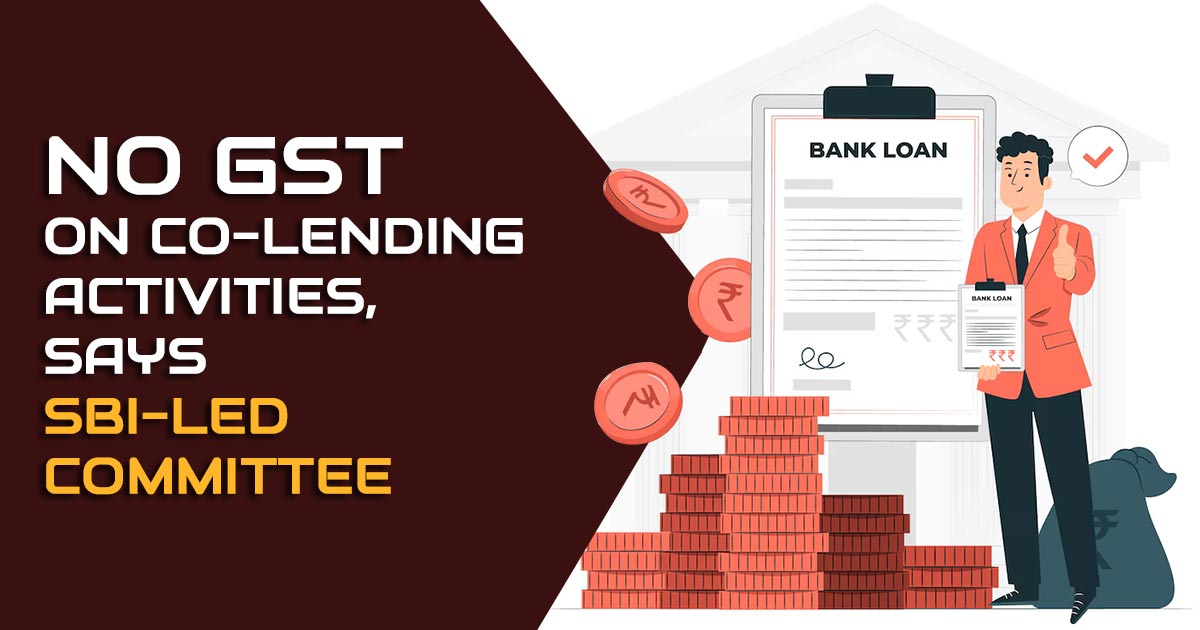
A State Bank of India (SBI)-led committee to motivate the co-lending between commercial banks and non-banking financial companies (NBFCs) has suggested removing the 18% GST.
As per the source, the SBI-led co-lending committee has furnished the report before the finance ministry where it suggested that no GST is to be levied on the co-lending related activities. The report suggested that co-lending must be limited to priority sector lending, and not extended to other areas because of the larger related risks.
In May 2024, the Department of Financial Services (DFS), which is part of the finance ministry, requested that SBI create a co-lending committee to tackle concerns about its business model.
Co-lending has not gained traction despite being allowed by the Reserve Bank of India (RBI) since 2018. Co-lending is anticipated to boost credit flow to unserved and underserved sections of the economy, including agriculture, micro, small, and medium enterprises (MSMEs), and housing.
RBI through permitting banks and NBFCs to collaborate has the objective to make loans more affordable to end-borrowers. Previously a senior finance ministry official has mentioned that the committee shall investigate why banks are nervous about entering the co-lending space.
SBI’s deputy managing director Surender Rana led the committee. It had representation from Punjab National Bank, Union Bank of India, and Central Bank of India from the banking sector. Three NBFCs have representation on the panel, including the Finance Industry Development Council (FIDC).
The DFS is anticipated to release guidelines derived from the report to enhance the co-lending sector. Last November, FIDC, which stands for the representative association of NBFCs, sent a letter to the chairman of the CBIC, arguing against the enforcement of GST.
No precise service is being furnished via one co-lender before the other in this arrangement. Rather than that they furnish the credit to the borrower. The interest rate differential shows their respective responsibilities and risks in this joint operation. As per that the excess interest imposed via the NBFC towards the co-lending arrangement must not be regarded as a servicing fee within GST, it mentioned.
The report said that each bank must secure a dedicated department for co-lending. A common channel between banks and NBFCs is building as per the report.
Read Also: GST Dept Lists DCB Bank Limited for Tax Payment Transactions
A separate appraisal and risk assessment procedure must be developed so that the load is not placed on one party.
Every operation has its strengths. They must collaborate for co-lending. One party must perform the assessment, while the other must accept it. The same is the thing on which we had agreed, another official mentioned.
An email sent before the finance ministry stayed unanswered till publication time.
As per the regulations, NBFCs needed to retain at least a 20% share of the individual loans on their books while the balance would be on the books of banks.
It is been predicted by CRISIL Ratings that the co-lending portfolios of NBFCs will probably reach Rs 1 trillion by June 2024. It is designated to have a yearly growth rate of 35-40 per cent over the medium term.
Read Also: No Tax on Late Fees, Fines and Penalties Received by RBI from Institutions
Separate appraisal and risk assessment methods must be developed for building a common channel between banks and NBFCs. It is anticipated through co-lending to improve credit flow to the unserved and underserved sections of the economy.